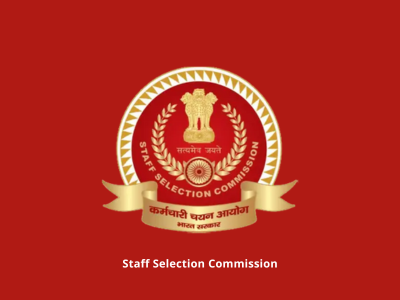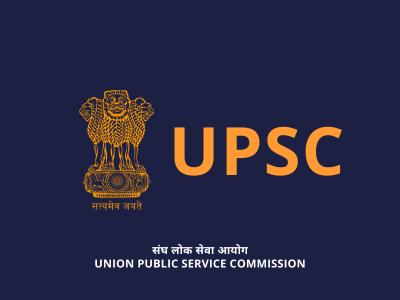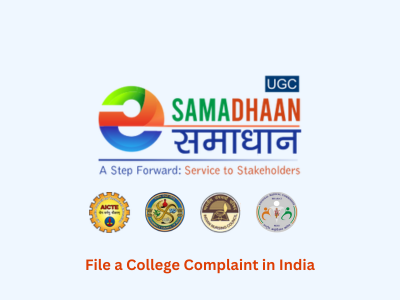
The college system in India is extensive and diverse, with over 1000 universities. The system is overseen by the University Grants Commission (UGC), which enforces standards and coordinates between the central and state governments. Institutions include central universities, state universities, deemed universities, private universities, and Institutes of National Importance like IITs, NITs, and AIIMS.
Students in India face various challenges, with mental health being a significant concern. High stress levels, depression, and anxiety are common among students, often exacerbated by academic pressure, family expectations, and competition for jobs. Other complaints include issues with the admission process, misleading information in prospectuses, withholding of certificates, and financial concerns related to fees and scholarships.
| Notice - Be alert! Don't share the financial or banking details and don't share OTP to customer care executive. Protect yourself from Frauds and Scams. Report to Cyber Crime Bureau or Call 1930 as soon as possible to protect your earnings and others. |
Are you one of the students who have complaints against your college?
We can relate that you’ve worked hard, paid your fees, and dedicated yourself to your studies. But your college isn’t living up to its promises. Maybe it’s the administration pressuring for fees, a professor who seems biased, facilities that are falling apart, or rules that just don’t make sense. It’s frustrating, and it’s not fair.
Don’t worry, you don’t have to just accept it. You have the right to be heard, and there are systems in place to make sure your concerns are addressed. Here’s how to make your voice count:
There are several routes you can take to file a complaint against your college in India, depending on the nature of the issue and your desired outcome. Follow these steps:
Level 1: Internal Complaint Redressal Mechanisms in Colleges
Most colleges in India have a system for handling student complaints. It’s called a Grievance Redressal Committee. They’re there specifically to listen to students like you and find solutions.
1. College Grievance Redressal Committee (GRC)
Every college affiliated with the University Grants Commission (UGC) or All India Council for Technical Education (AICTE) is required to have a Grievance Redressal Committee. This committee is specifically designed to address student grievances and find internal solutions.
Look for information on the complaint process in your college handbook, student manual, website, or notice boards. This is generally the first step, as it allows the college to address the issue promptly and efficiently.
2. College Ombudsman
Some colleges may also have an ombudsman, an independent official who investigates complaints and mediates between students and the college administration. This can be a helpful option if you feel the GRC process isn’t working or if you’d prefer a neutral third party involved.
Please note: Before you file that complaint, gather your evidence. Did a professor make a discriminatory comment? Write down the date, time, and what was said. Promised facilities not available? Take photos or videos. The more details, the stronger your case.
Level 2: Government Authorities for Higher Education
Sometimes, things don’t get resolved the first time. If your college’s response isn’t satisfactory, don’t despair. There are higher government authorities for higher education designed to protect student rights:
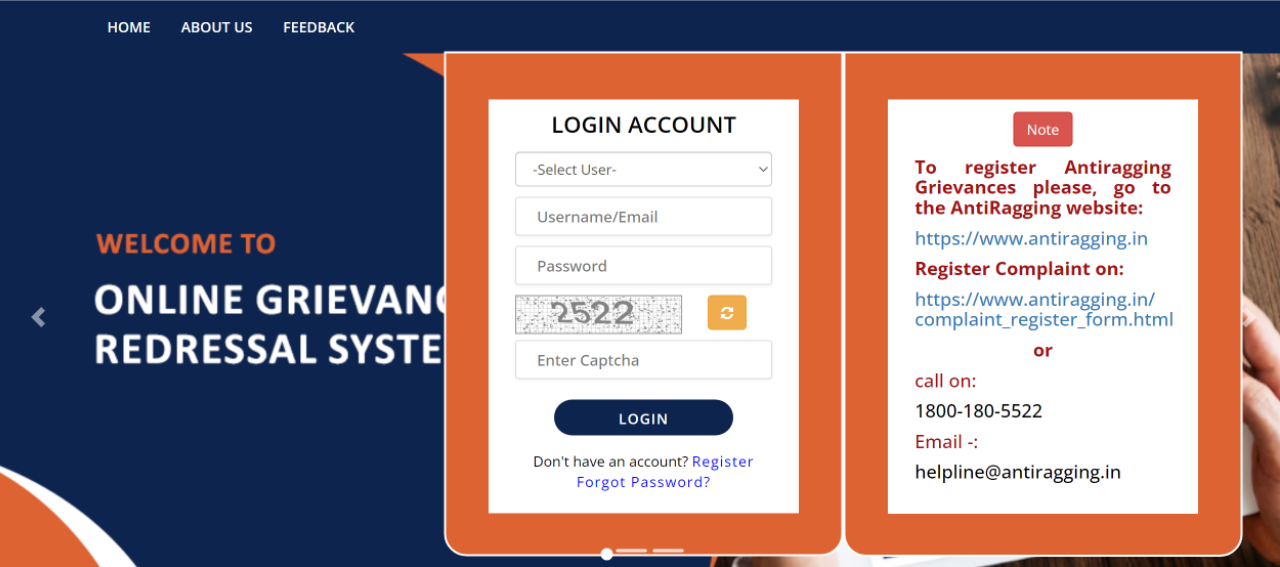
1. UGC e-Samadhaan Portal
Launched by the UGC, this online portal provides a centralized platform for registering grievances against universities and colleges. Here, you can file a detailed complaint online outlining the issue, attaching supporting documents like emails, letters, or recordings if available.
- e-Samadhaan (ugc.ac.in)
- Phone Number: 1800111656 (general query), +917923268279 (for technical help)
- Email: ugc.technical@inflibnet.ac.in
This is a good option for complaints related to UGC regulations, such as unfair grading practices, discrimination, or issues with faculty. It’s also a viable route if you’re dissatisfied with the resolution offered by the college’s internal grievance committee.
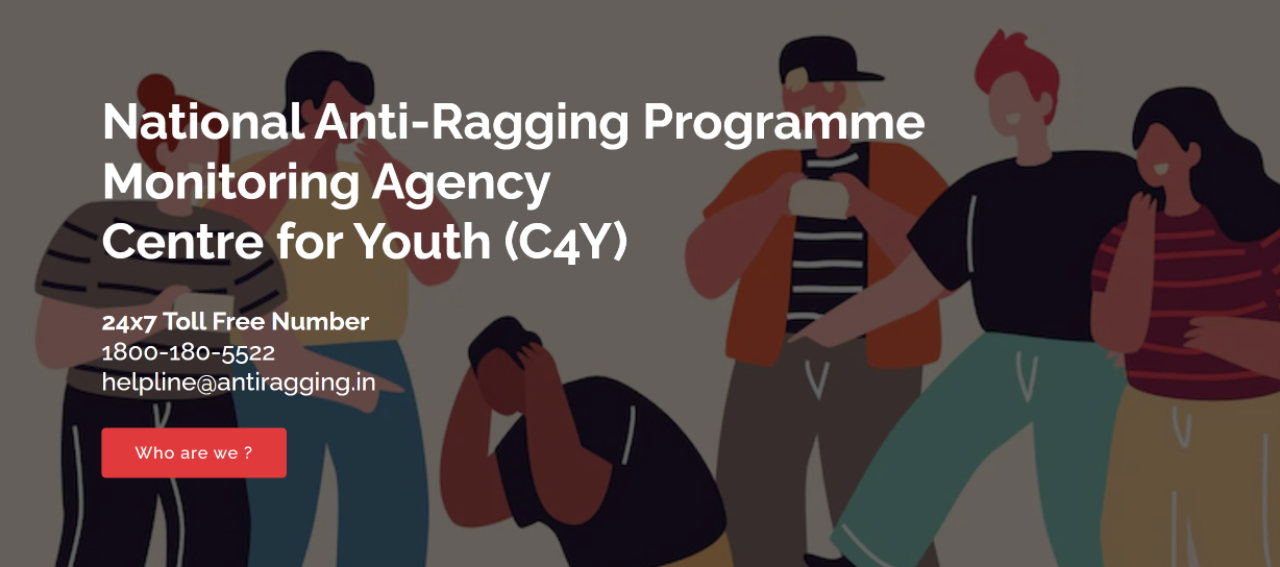
Have complaints regarding ragging in college? Register a complaint here:
- Report to Anti-Ragging Grievance Cell
- Helpline Number: 18001805522
- Email: helpline@antiragging.in
2. Other Regulatory Bodies
If your college is affiliated with a specific regulatory body like AICTE (technical education) or a medical education regulator, they may have their own grievance redressal mechanism. For instance, AICTE has a centralized support system for filing complaints against affiliated institutions.
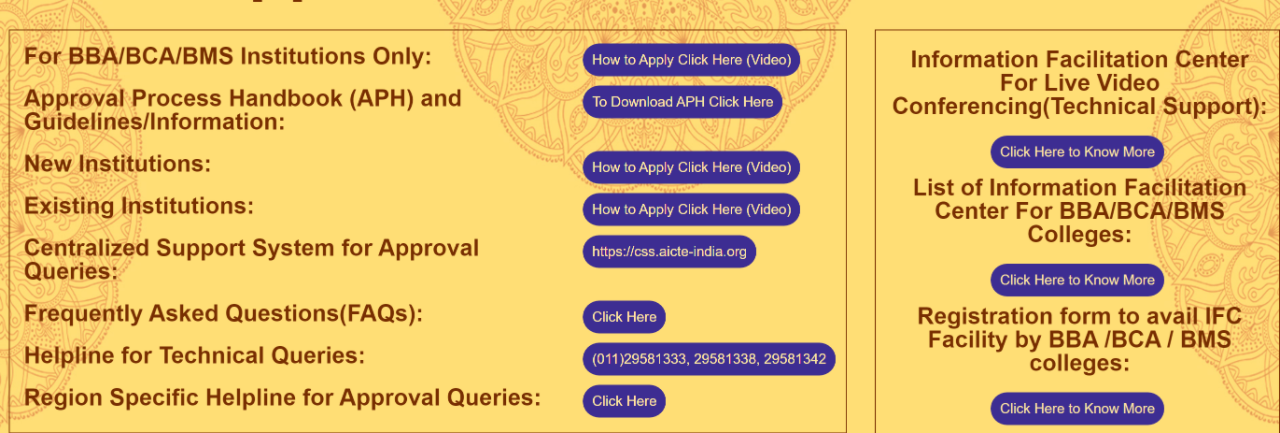
- AICTE (All India Council for Technical Education): Governs Engineering, technology, architecture, pharmacy, hotel management, management, and other technical areas.
- National Medical Commission: Governs Medical education (MBBS, postgraduate medical courses, etc.)
- DCI (Dental Council of India): Governs Dental education (BDS, postgraduate dental courses, etc.)
- PCI (Pharmacy Council of India): Govens the colleges of pharmacy education
- INC (Indian Nursing Council): For Nursing Education
- CoA (Council of Architecture): For the Colleges of Architectural Education
Explore the websites of these relevant regulatory bodies to find their specific grievance filing procedures.
3. National Consumer Helpline (NCH)
Colleges can be considered service providers under the Consumer Protection Act. If your complaint pertains to a deficiency in service, such as misleading information during admission or failure to deliver promised facilities, you can file a complaint on the National Consumer Helpline.
- File a complaint online to NCH
- Helpline Number: 1800114000 or 14404
This route might be suitable for issues like the non-availability of essential infrastructure or facilities or false advertising by the college.
You can also file a formal consumer complaint to the District, State, or National Consumer Dispute Redressal Commission (also known as consumer court) to demand compensation from a college, institution, or university.
Additional Tips for a Stronger Case:
When filing your complaint, ensure you have clear and concise documentation of the issue. This could include specific details like dates, times, names of people involved, and any relevant evidence you might have (emails, letters, recordings). Try to keep copies of all communication with the college administration, the GRC, or any other authorities you contact regarding your complaint. This creates a documented record of your efforts to resolve the issue internally.
If the process seems complex or you require additional support, consider seeking guidance from student rights organizations or legal aid cells. These resources can provide valuable advice and assist you in navigating the complaint process.
By understanding the different available mechanisms for lodging an education complaint and taking the time to document your case effectively, you can increase your chances of a successful resolution to your complaint.
Remember, the most appropriate course of action will depend on the specifics of your situation. If you’re unsure which route to take, it’s advisable to start with the college’s internal complaint mechanism and escalate to external channels if necessary.




